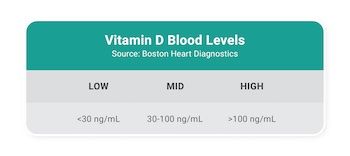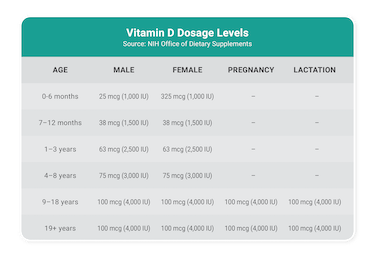Can I get too much vitamin D?
Vitamin D is having its 15 minutes of fame – it was recommended as a daily supplement by Dr. Anthony Fauci to boost the immune system, and scientists are researching vitamin D and COVID-19 hospitalizations. However, it is possible to have too much of a good thing, and vitamin D is no exception.
Too much vitamin D can cause lasting damage to your body. Many of these negative effects of vitamin D toxicity are caused by extremely high doses (50,000-100,000 IU) over months or years. However, it’s important to note that long-term moderate dosing can also be harmful to some people.
Here’s what you need to know about vitamin D toxicity – and what you can watch out for.

How do I know if my vitamin D levels are too high?
While certain conditions may be evidence of high vitamin D levels, the only way to know your levels is to get tested. Here are the categorizations of vitamin D levels, according to Boston Heart Diagnostics:
- Low: <30 ng/mL
- Mid: 30–100 ng/mL
- High: >100 ng/mL
![]()
Elevated blood calcium levels
Taking too much vitamin D can cause a condition called hypercalcemia, or too much calcium in your blood. Patients with hypercalcemia may experience symptoms such as fatigue, confusion, irritability, hallucinations, nausea, and vomiting. While it can take an extreme amount of vitamin D to cause this condition, too much calcium can cause detrimental effects to your body.
![]()
Bone loss
Vitamin D is a crucial factor in building and maintaining strong bones. However, too much vitamin D can cause the opposite effect. In one study from the University of Calgary, researchers found that bone mineral density was significantly lower in patients who took 10,000 IU of vitamin D per day, compared to patients who only took 4,000 IU per day over a 3 year period.
![]()
Kidney problems
Vitamin D has been linked to several cases of acute kidney problems. In one study, 62 patients who were receiving high-dose vitamin D injections were found to have acute kidney injury. In another case study, a 54-year-old man with no history of kidney issues received permanent kidney damage after taking 8,000-12,000 IU of vitamin D per day for over two and a half years. While further research is needed to determine how vitamin D impacts kidney function, these issues highlight the importance of getting a physician’s input on remedying your vitamin D deficiency.

This chart displays upper vitamin D intake levels recommended by the NIH.
Other risks from too much vitamin D
Despite available research, we still don’t know how vitamin D levels affect people with different genetic make-ups. Some evidence suggests that vitamin D levels over 50 ng/mL can be harmful for some individuals, while vitamin D levels above 150 ng/mL are certainly harmful for most people.
Another study found that vitamin D supplementation increased the risk of colon cancer for some individuals, and decreased the risk in others. Knowing more about your unique genetic profile can help you understand your optimal vitamin D levels and if supplementation is right for you.
Further research is needed to determine the exact effects of vitamin D toxicity on the body, but for now, talk to your primary care physician about how much vitamin D is right for you.


